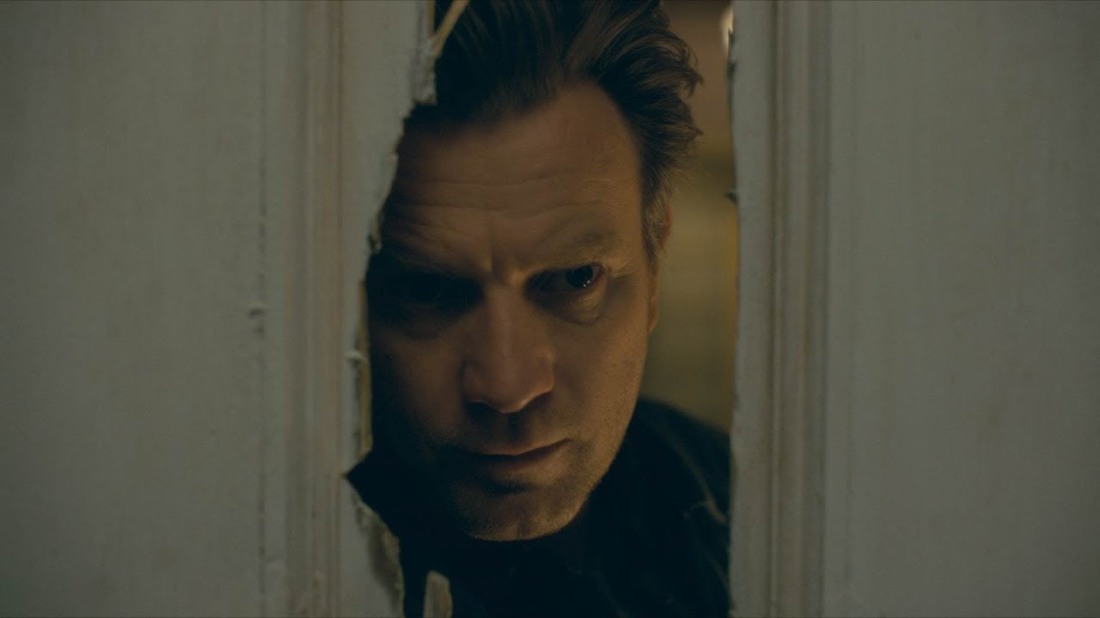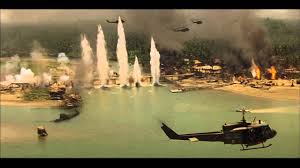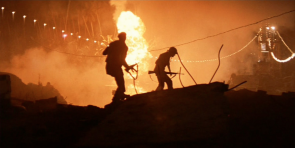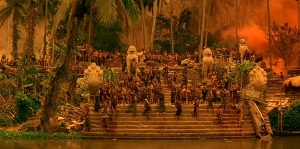Atlantics is a Senegalese film, dubbed a supernatural romantic drama, and as I walked into the Curzon theatre, I had only a very brief plot summary to give me any expectations. One hundred and four very enjoyable and satisfying minutes later, I was still unable to truly pin this film down to a singular plot line or overarching theme but was still incredibly charmed and fascinated. Impressed too, especially considering this is Mati Diop’s feature directorial debut, winner of the Cannes film’s festival’s Grand Prix and the festival’s first black female to be in competition. There’s something about watching a film with just three other people in the cinema, something more intimate and immersive as if you are the only person who will ever see this drama unfold.
One of the key themes of this drama is oppressive patriarchy, particularly directed to the protagonist Ada who is pressured into marrying Omar, when she is in love with Souleiman. Omar is incredibly wealthy, buying Ada iPhone’s and clothes whilst they lounge at a luxurious beach resort. But Ada is visibly apathetic towards Omar and his wealth, much happier with Souleiman behind an abandoned building next to the sea. The first shot we see of them together is a beautifully tragic demonstration of their relationship, only allowed brief glimpses of each other through the gaps of an oncoming train, a metaphor for how they have few moments to be together as the unstoppable marriage of Ada to Omar separates them. This characterisation of Ada, not seduced by the materialistic plenitude of Omar, as a strong female character is important to perhaps dispelling some perceptions of women as submissive and property of men, in a pre-dominantly Muslim society such as Senegal. By refusing to let material possessions sway her into loving Omar, she contradicts another Western expectation of African societies, particularly those less developed than our own, that those not evidently rich are living in some extreme poverty and would immediately jump at the chance to become wealthier. Ada’s home life, whilst not in any way well-off compared to our Western standards, is still not in poverty and she seems fairly comfortable in this setting. In many ways they have normal young adult lives, her and her female friends, they have phones, go to drink at her friend Fanta’s bar and lead relatively routine lives. But the reality of living in families and communities which are strongly religious, despite Senegal’s religious tolerance and secular state, is that Ada acquiesces to marry Omar. After Ada talks to Omar in an unenthusiastic way on the phone, her mother warns her “you talk sweetly to a man. Otherwise he’ll take a second wife before you get pregnant” emphasising the obvious patriarchy Ada is subjected to, told that marriage is an important and holy event, but her husband is allowed multiple wives and if she doesn’t treat him exactly right, he won’t do her the favour of getting her pregnant. It’s not violently dramatic abuse but it’s subconscious and consistent. It’s at its most harrowing when Omar demands Ada take a virginity test to prove her loyalty, an uncomfortable procedure for a Western audience to start processing, demonstrating the ownership Omar feels he has over Ada and her body. Even her peers are oppressive in their castigation of her for perceived sins, Mariama piously telling her “you know you’re marrying Omar in ten days? Before God. Hanging out with those sluts has changed you ”. Notably Mariama is wearing a purple hijab, with purple connoting religious faith and the hijab symbolising modesty, Mariama is an embodiment of conservative and religious values that move to oppress Ada throughout the movie and force her to suppress her sexuality and feelings for Suleiman.
Another prominent theme in Atlantics is the relationship, or juxtaposition between the rich and poor. The opening shot of a large futuristic building, the Muejiza tower, is immediately contrasted to the dusty building sites Souleiman and his friends are currently working on, four months without pay from an absent boss. It seems any movie worth its salt at the moment deals with the issue of class and the elite’s oppression of the poor, in a world where the inequality between the richest and poorest is growing it would be naive to ignore this, in my opinion, perhaps part of the reason why Bong Joon Ho’s Parasite became the first foreign language to win best picture at the Oscars and be so well received, its a theme that transcends language. That Souleiman and others are forced to try and migrate to Spain is an indictment of the circumstances imposed upon him, unpaid labour, no opportunities; an obvious critique of capitalist society. The boys that do venture across the ocean to Spain, are tragically killed in a storm, leaving the chilling thought of them as “unburied bodies at the bottom of the ocean”, which is very striking imagery that to me shows how far out of sight society has pushed them after their uselessness has gone away, at the very bottom of the ocean, landfill but even further down than the land itself, beyond any possible salvation. Like in Parasite, the working class do get a chance of a revenge of some sorts. In a dramatic twist, Souleiman and his friends who were lost at sea possess Ada’s friends, and in a zombie-like trance they go to the house of the construction boss. The haunting image of the girls, whose eyes are rolled back in their heads, and the nature of the twist, which feels so unexpected and such a genuine shock to the viewer, combine for a tense showdown, in which they demand the money they are owed or his building will be burned down.
The Ocean, cause of Suleiman and his friends deaths, is constantly shown in some of the most gorgeous shots you’re likely to see in film. The whirling masses of water create an awe-inspiring image as we realise the futility of Suleiman’s voyage to find work: we’ve never seen an ocean look so massive. What we also have to face up is that Souleiman HAS to try and venture across this beautiful yet fearsome body of water. The exploitation he has faced through the owner of the construction company, essentially using Souleiman as slave labour means he is lured by the promise of work in Spain, and perhaps lured by the sublime beauty of the ocean, symbolising (the ultimately false) prospect of adventure and a chance at a worthwhile life.
I can’t say that I am a foreign film aficionado. The few I have watched have usually been for academic reasons rather than by choice. But I have enjoyed all of them bar none, Run Lola Run being a personal favourite. So Atlantics is the first one I’ve chosen to watch, with only the aforementioned brief summary plot, and like the others I’ve watched it was an extremely enjoyable experience. I think there is a sensation of watching a foreign film, this perception of it as an “other” and a sense of mystery that films in our own language often lack. It may be a sweeping generalisation but in my view they often seem less rushed and let the plot breathe, not forcefully pushing us through the story, and Atlantics does this perfectly. While the basic premise of the film is clear, what it’s all leading to is ambiguous, it could be anything, as Kristia Smith said in an interview with Mati Diop, part “Ghost story, it’s a thriller, it’s a love story, it’s a family story”. It’s why the twist of the girls becoming possessed loses none of its potency because its not been telegraphed to death. That is perhaps one of the main beauties of foreign films, we are freed, atleast to an extent, from our usual expectations and cliches, from the popular locations, actors and directors we’ve seen before. Atlantics, not just because of its status as a foreign film, is a breath of fresh air.







